PHASE 1
BE PART OF THIS GLOBAL NETWORK: DEMO.RESET.
FORMED BY PRACTITIONERS OF DELIBERATIVE DEMOCRACY
This phase has contributed to enabling the exchange among practitioners in the Global South.
The project created groups and exchange sessions at diverse schedules that were convenient for all practitioners. Participants had the opportunity to share, make questions and strengthen their projects in rigorously designed spaces. Diverse initiatives have met to exchange their experiences, best practices, learnings, methodologies, and strategies.
ACTIVITY ONE
FOCUS GROUPS
GOAL
To identify and understand deeply and carefully what are the interests and barriers of practitioners in the field of deliberative democracy in the Global South, through ten focus groups.
ANALYSIS

10 initiatives related to the quality and inclusiveness of young people and women empowerment.
5 initiatives that combat climate change from alternative, local, solidarity-based and agro-ecological perspectives.
6 initiatives defending human rights, including civic rights

A region interested in deepening the processes of participation, especially of young people and in climate change issues. climate change

18 initiatives related to citizen participation for the quality and inclusiveness of the participation processes of young people and women.
5 initiatives defending human rights and digital and civic rights.
4 initiatives focused on conflict stabilization and peace-building.
2 initiatives focused on defending rural populations’ rights.

4 initiatives related to civic rights, and religious rights, two of them focused on advocacy from civil society and the other two initiatives on citizen training to improve the quality of participation.
2 initiatives focused on the defense of the rights of rural populations, construction of just climate transitions, agroecology, and food sovereignty
2 initiatives in quality of participation.
2 initiatives in climate change and biodiversity conservation.
Discoveries
The participating organizations stated that they encountered certain barriers to their deliberation processes, such as:
MODALITY
ACTIVITY TWO
EXPERIENCE EXCHANGE MODEL
GOAL
Facilitate the circulation of knowledge about deliberative processes in the Global South.
EXCHANGE OF EXPERIENCES SESSIONS
SPEAKERS PER SESSION
PEOPLE APPROXIMATELY CONNECTED PER SESSION
sessions
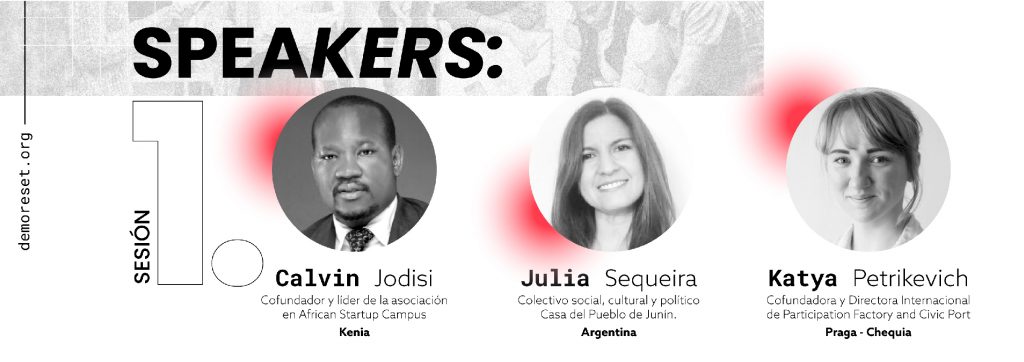
Design for deliberative democracy
Replicability over time and in other spaces implies an important effort to adequately train trainers and, at the same time, generate informative and educational brochures and documents on the step-by-step deliberation process.
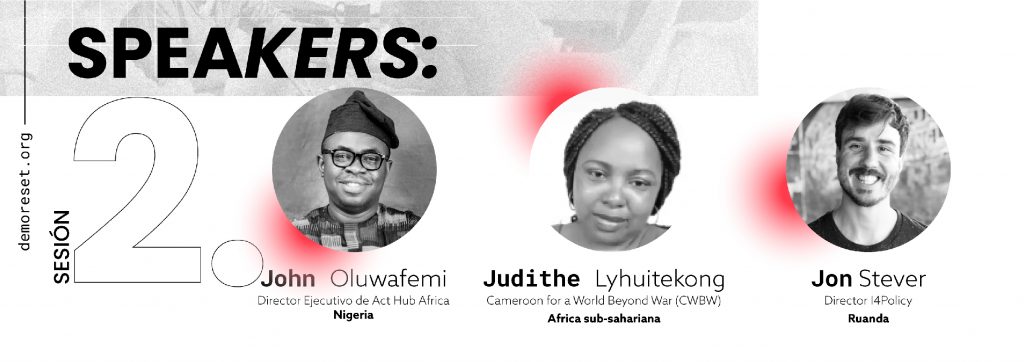
Methods and tools for decision making beyond voting.
The organization of successful elections is considered a sign of democratic vitality. However, in many countries, especially in Africa, voting has its limits and elections are costly in terms of human lives and lead to various forms of violence. There are several ways, outside of elections, in which the people can influence a decision or repeal a law. Some examples are civil disobedience, hunger strikes and peaceful protest marches.
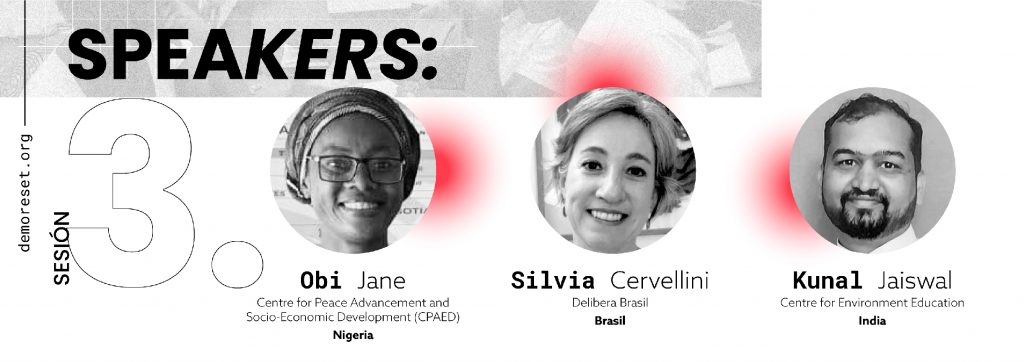
Inclusive outreach for deliberative democracy processes
The organization of successful elections is considered a sign of democratic vitality. However, in many countries, especially in Africa, voting has its limits and elections are costly in terms of human lives and lead to various forms of violence. There are several ways, outside of elections, in which the people can influence a decision or repeal a law. Some examples are civil disobedience, hunger strikes and peaceful protest marches.
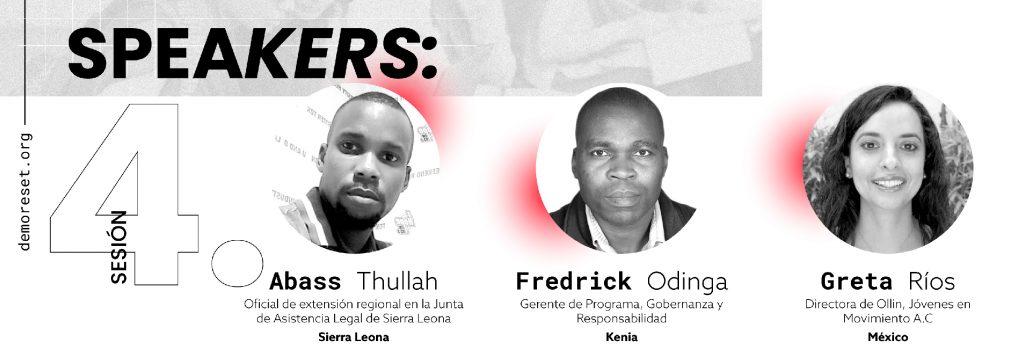
Communication for public engagement in deliberative democracy deliberative democracy
A well-developed communication strategy is of great importance for all organizations working in public participation. organizations working in public participation. In this sharing session, many effective many effective communication strategies that can guide organizations in their public participation processes. organizations in their public participation processes.
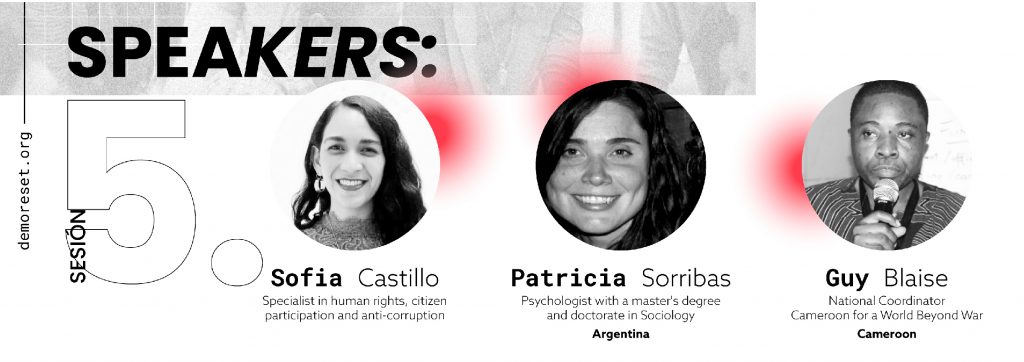
Deliberation from the south: practices and mechanisms.
In citizen participation spaces, the organizations in charge must focus on strengthening communication, socializing and informing participants prior to the meetings to generate greater interest in participation, but also during and after the meetings, continuing to show the impacts they have achieved for the possibility of replicability.
MODALITY
activity three
demo.talks
goal
Transfer best practices from practitioners to practitioners in depth. Master classes will take the best of deliberative experiences and teach methodologies, strategies and models to other practitioners from the global south.
methodology

This methodology is designed for you to learn and/or strengthen your knowledge, it will be open on our demoreset.org platform. In July stay tuned watch out for our first Demo.Talks.
Demo.Talks
MASTER CLASS # 1
1. Introduction to deliberative democracy.
Professor: Andre Noel Roth.
MASTER CLASS # 2
2. Barriers to deliberative democracy I – structural factors.
Professor: Maria Paulina Ibarra.
MASTER CLASS # 3
3. Barriers to deliberative democracy II – structural factors.
Professor: Susan Lee.
MASTER CLASS # 4
4. Principles of deliberative democracy i – ¿quién participa? inclusión mediante sorteo cívico.
Professor: Yago Bermejo.
MASTER CLASS # 5
5. Principles of deliberative democracy ii – consensus and decision making.
Professor: Claudia Chwalisz.
MASTER CLASS # 6
6. Deliberation and participatory democracy in latin america.
Professor: Yanina Welp.
MASTER CLASS # 7
7. Democratic innovations in the global south.
Professor: Azucena Morán and Melisa Ross.